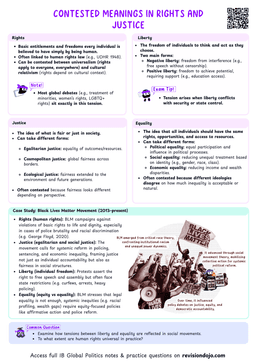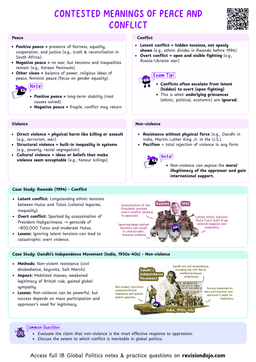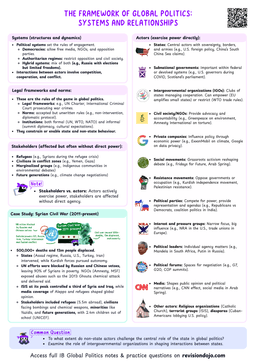IB Global Politics IA Engagement Project Guide
Why the Engagement Project actually matters
- It’s politics off the page.
- Most of IB is about essays, exams, and theory. The Engagement Project is where you get your hands dirty with real-world politics.
- Instead of just reading Nye or Waltz, you can say: “Yeah, I interviewed an activist, and this is how power actually plays out.”
- It’s your project, your choice.
- You’re not stuck analyzing something random. You pick the issue.
- Into climate change? Migration? Human rights?
- The project lets you chase what genuinely interests you, which makes it way more fun to research.
- It makes theory click.
- Ever read a definition of “legitimacy” or “sovereignty” and thought, okay, but what does that even mean in practice?
- The Engagement Project is where those abstract ideas start to make sense because you see them in action.
- It shows off your independence.
- This isn’t just busywork. It’s a chance to prove you can investigate, analyze, and think like a political scientist.
- That looks impressive for uni apps and, honestly, makes you feel a little powerful yourself.
- The IA (Internal Assessment) Engagement Project is a required component of IB Global Politics. It involves:
- Choosing a local or community-level political issue
- Conducting research and engagement (not just academic research)
- Writing a report that reflects on your learning and experience
- The key idea is that you must actively engage with the issue, not just study it.
- This could include interviews, volunteering, attending events, or direct observation.
The Process Overview
- Planning: Define your political issue and create a research question
- Research: Investigate the issue, the actors involved, and possible solutions
- Engagement: Participate in or observe real-world activities connected to your issue
- Reflection & Reporting: Analyse what you learned, link to political theory, and write up the findings
- Key Requirements (HL vs SL)
- HL:
- 35 hours
- 2,400 words max
- 30 marks total (20% of final grade)
- Must include a recommendation for action
- SL:
- 25 hours
- 2,000 words max
- 24 marks total (30% of final grade)
- HL:
- Note: Word count excludes citations, references, bibliography, appendices.
How to Choose a Political Issue
Ask:
- Who has power? Who lacks it?
- Who wants to change things? Who resists change?
- What impact does the issue have on people’s lives?
Possible actors:
- Governments (local, national, international)
- NGOs and civil society
- Private companies
- Interest groups or political parties
- The media or specific leaders
- Localise the issue: Your project should focus on a real issue in your own community.
Engagement Ideas
- Interview local activists, politicians, or stakeholders
- Volunteer with a relevant NGO or campaign
- Observe a political protest, public hearing, or policy meeting
- Help run or analyse a political awareness campaign
- Important: Passive activities like just attending a talk or reading articles are not enough.
- You need to demonstrate active involvement.
Possible Issues to Explore
- Climate action: e.g. local renewable energy projects, city recycling policies, or community climate strikes.
- Migration & refugees: local support groups for asylum seekers, housing policies, or integration programs.
- Human rights: treatment of minority groups, gender equality campaigns, or policing and accountability.
- Health & equity: access to mental health services, vaccination campaigns, or healthcare inequality.
- Housing & development: rising rent, affordable housing campaigns, or urban regeneration conflicts.
- Education access: funding disparities between schools, curriculum debates, or activism on student debt.
- Digital politics: surveillance, data privacy in your city, or the politics of online misinformation.
- Labor rights: gig economy protections, strikes, or campaigns for fair pay.
Common Problems & Solutions
| Problem | What to Do |
|---|---|
| No one replies to my emails | Follow up, call, visit in person, have backups |
| Engagement wasn’t useful | Reflect and revise your research focus |
| Unsure if I’ve done enough | Ask teacher, reflect on what you’ve learned |
Ethical Considerations
- Prioritize safety, yours and others’
- Respect laws, cultures, and consent
- Keep interview data confidential and anonymous
- Don’t lie, exaggerate, or fabricate anything
IA Engagement Project: PEEL+R Structure
- Each body section should follow PEEL+R:
- Point → clear claim / finding.
- Evidence → research + engagement data.
- Explanation → connect evidence to political meaning.
- Link → tie back to research question / theory.
- Reflection → your learning, limits, perspective shift.
SL Report (~1,950 words)
1. Intro (≈200 words)
- Define issue + research question.
- Context (who’s involved, why it matters).
- Key political concepts.
- Reflection: why you chose it, initial perspective.
2. Research Findings (≈450 words)
- P: Finding about actor/issue.
- E: Data, case studies, secondary sources.
- E: What this reveals about power, legitimacy, sovereignty, etc.
- L: Tie back to RQ.
- R: What surprised you about the research process?
3. Engagement (≈350 words)
- P: What your engagement showed (e.g. NGO strategy, protest dynamics).
- E: Observations, interviews, volunteering experience.
- E: Why this matters politically.
- L: Connect to theory and research.
- R: Challenges, ethical issues, or perspective shifts.
4. Analysis & Synthesis (≈600 words)
- P: Claim combining engagement + research.
- E: Specific examples from both sides.
- E: Apply theory (justice, legitimacy, sovereignty, agency).
- L: Explicitly connect to RQ and course concepts.
- R: How your understanding of politics deepened.
5. Evaluation (≈200 words)
- P: Judgement (e.g. effectiveness of actors/policy).
- E: Evidence for strengths + weaknesses.
- E: Acknowledge biases or limits in sources/engagement.
- L: Connect to broader implications.
- R: What gaps remain in your knowledge?
6. Conclusion (≈150 words)
- P: Direct answer to RQ.
- E: Summarise strongest evidence.
- E: What this means politically.
- L: Link back to key concept(s).
- R: Final reflection - personal/political learning.
HL Addition (≈400 words): Recommendation
- P: Clear one-sentence proposal.
- E: Evidence + insights from research and engagement.
- E: Feasibility, actors, precedent.
- L: Tie to theory and political agency.
- R: Risks, unintended consequences, what you learned.
Assessment Criteria (SL)
- A: Explanation & Justification (4): Clearly explain the issue and justify your engagement choice
- B: Process (3): Show your research and planning process
- C: Analysis & Synthesis (8): Go beyond description, analyze the issue and combine perspectives
- D: Evaluation & Reflection (6): Critically assess sources and reflect on your learning
- E: Communication (3): Write in a clear, well-organized way
Extra for HL Students
- H: Recommendation (6 marks)
- Propose a feasible, evidence-based solution to the issue
- It should be grounded in your research and engagement, not just opinion
- The following do not count toward the word limit:
- Acknowledgments
- Contents page
- Tables, diagrams, figures
- Equations, formulas, calculations
- Citations & references (if in footnotes/endnotes)
- Bibliography
- Appendices
- But: Definitions + direct quotations in the body do count.
- Choose an issue you genuinely care about
- Plan ahead and leave time for setbacks
- Stay reflective throughout
- Follow ethical guidelines
- Link everything back to power, political agency, and course concepts
- The IA is your chance to bring theory to life.
- Make it count!


